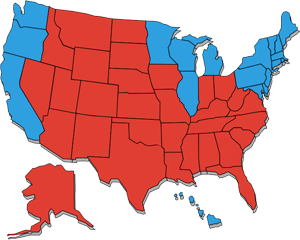Vote the bastards out!
Midterm elections are coming up on November 7 — and it is your patriotic duty to vote. More importantly, if you want to continue complaining about politics, the economy, the price of gas, the thousands of people dying from preventable diseases, or even what morons our elected leaders are without being hypocritical bastards, you need to vote.
The traditional, recommended method of deciding who to vote for is to read newspapers, analyze statements and platforms from candidates, watch televised debates, and so forth. Unfortunately, this takes a lot of time and work. Because you're browsing the internet rather than doing something productive, I can assume you don't like doing work.
This leads to the more common method of deciding who to vote for. Align yourself with one of the two mainstream political parties. (Or with the Green Party if you want to annoy your parents.)

Of course, this second method isn't particularly attractive either. Evidently, some people hear "pick your poison" when asked to "pick your political party." And we have a two-party system. There is no, "Um... could I just have some water?" Therefore, your friends at Marco.org are bringing you the official 2006 Marco.org Voting Guide. The underlying premise of the guide is simple.
The Goal

snakes in this motherfucking Congress.
The Reasoning
The two major political parties don't seem to agree on a lot. However, they do seem to agree that they like being in Congress. Both parties have been redrawing electoral maps in order to protect their own incumbency. Enough is enough.
The Platform
The platform is simple. Figure out who your congressperson is. (House/Senate) You should know this anyway — it could make you look educated some day. Now, in November, vote against this person. Generally this means voting for the most probable challenger.
Exceptions
There may be some exceptions to this platform. First, what do we do about third-party candidates? In many cases, the incumbent may have no meaningful challenger. A strong third-party vote could send a stronger message than a slightly weaker margin of victory over the other party.

"Senator"? I thought this
was the American Idol audition.
Secondly, there is a chance that your challenger is even more odious than your incumbent. For example, your challenger might also have spent time in Congress. Alternatively, your challenger might be on record saying things like, "If you're not electing Christians, then in essence you are going to legislate sin." There is also a slight chance that your incumbent could be a decent person. For example, your incumbent might be in Congress by accident. Again, if you think there is an overwhelming reason to vote for your incumbent, make your requests in the forum.
A list of approved exceptions will be posted here before the election.